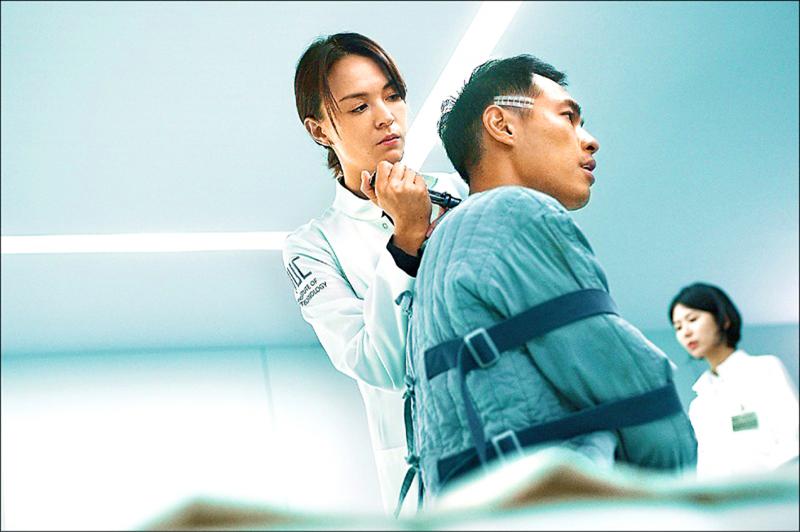Touted as the Taiwanese version of M Night Shylaman’s 2016 Split, Plurality also deals with kidnappings and multiple personalities who vie for control of one body.
Tony Yang (楊祐寧) does a great job at portraying the distinct personas within him — despite their mannerisms being a bit exaggerated to distinguish them — and convincingly and single-handedly carries this action-packed, twist-filed thriller despite the flawed script filled with puzzling developments and improbable scenes.
At the very least, the backbone of the story (the personalities) and the surprise turns are solid, and if you’re just watching the movie for pure entertainment, it’s a pretty fun ride. Set in the near future, the film begins with a bus crash where nobody survives. Police are convinced that the criminal responsible for the kidnapping of a legislator’s son was on the bus, and using experimental technology they implant the personas of every person on board into Yang’s character (Case 193), who was in a vegetative state.

Photo courtesy of Activator Marketing Company
It’s a fun idea as it departs from the traditional concept of multiple personalities, which are generally created within one person due to traumatic events. The personas in Plurality led distinct lives before being crammed into 193’s body and retain their memories, which allows for more freedom with storytelling, especially when they interact in a futuristic dreamworld inside the brain.
It was probably a wise idea to make it a small bus with just five people on board instead of trying to completely emulate Split, which features 23 personalities, as the screenwriters seem to barely make the premise work in Plurality. It makes it easier for the viewer to follow what’s going on as well.
Of course, the scientific process goes haywire during the interrogations, and Detective Wang (Frederick Lee, 李銘忠) and Dr Shen (Sandrine Pinna, 張榕容), who harbor their own motives and disapprove of each other’s methods, scramble to clean up the mess and solve the crime before it’s too late.
The two are capable actors who receive abundant screen time, but unfortunately their roles aren’t very memorable as they serve as one-dimensional characters who keep making inexplicable decisions just to drive the plot forward. As mentioned earlier, Yang is the main show here. He traverses between the world of 193’s consciousness and reality, dealing with immense adversity in both realms, struggles with identity and is forced to help solve a crime while every personality tries to get what they want.
The problem is that director Aozaru Shiao (蕭力修), who took a seven-year break from feature films to helm Public Television Service’s acclaimed series Wake Up (麻醉風雲), seems to have poured all of his creative juice into Yang’s character. The other personalities, played by notable thespians such as Chen Yi-wen (陳以文), who won Best Leading Actor at 2019’s Golden Horse Awards, and rising star Gingle Wang (王淨), who impressed in Detention (返校), are unfortunately also quite generic and forgettable, wasting their superb talent.
Plurality has obvious similarities with January’s excellent The Soul (緝魂, still in theaters), as both films are crime-thrillers set in the near future and feature experimental technology involving human consciousness. But the two will appeal to different types of audiences as The Soul is a grim, contemplative deep-dive while Plurality is more of a Hollywood-style fast-paced action jaunt.
Both have their worthy qualities, and are part of Taiwanese cinema’s fast-improving and trending sci-fi and crime-thriller portfolios. It’s hard not to be too derivative from the West’s long history of the genres, but the filmmakers are finding their own styles and at least trying to tell unique stories.
While there’s still quite a bit to gripe about, Plurality is definitely a positive step for the nation’s rapidly-evolving film scene.

Following the rollercoaster ride of 2025, next year is already shaping up to be dramatic. The ongoing constitutional crises and the nine-in-one local elections are already dominating the landscape. The constitutional crises are the ones to lose sleep over. Though much business is still being conducted, crucial items such as next year’s budget, civil servant pensions and the proposed eight-year NT$1.25 trillion (approx US$40 billion) special defense budget are still being contested. There are, however, two glimmers of hope. One is that the legally contested move by five of the eight grand justices on the Constitutional Court’s ad hoc move

Stepping off the busy through-road at Yongan Market Station, lights flashing, horns honking, I turn down a small side street and into the warm embrace of my favorite hole-in-the-wall gem, the Hoi An Banh Mi shop (越南會安麵包), red flags and yellow lanterns waving outside. “Little sister, we were wondering where you’ve been, we haven’t seen you in ages!” the owners call out with a smile. It’s been seven days. The restaurant is run by Huang Jin-chuan (黃錦泉), who is married to a local, and her little sister Eva, who helps out on weekends, having also moved to New Taipei

The Directorate-General of Budget, Accounting and Statistics (DGBAS) told legislators last week that because the Chinese Nationalist Party (KMT) and Taiwan People’s Party (TPP) are continuing to block next year’s budget from passing, the nation could lose 1.5 percent of its GDP growth next year. According to the DGBAS report, officials presented to the legislature, the 2026 budget proposal includes NT$299.2 billion in funding for new projects and funding increases for various government functions. This funding only becomes available when the legislature approves it. The DGBAS estimates that every NT$10 billion in government money not spent shaves 0.05 percent off

Dec. 29 to Jan. 4 Like the Taoist Baode Temple (保德宮) featured in last week’s column, there’s little at first glance to suggest that Taipei’s Independence Presbyterian Church in Xinbeitou (自立長老會新北投教會) has Indigenous roots. One hint is a small sign on the facade reading “Ketagalan Presbyterian Mission Association” — Ketagalan being an collective term for the Pingpu (plains Indigenous) groups who once inhabited much of northern Taiwan. Inside, a display on the back wall introduces the congregation’s founder Pan Shui-tu (潘水土), a member of the Pingpu settlement of Kipatauw, and provides information about the Ketagalan and their early involvement with Christianity. Most